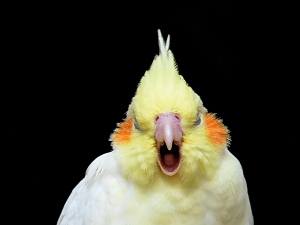
Allergens can cause minor issues, or, they can be very dangerous not only for humans but for animals and birds, like cockatiels too.
This article is a look into what cockatiels are allergic to
Table of Contents
What are cockatiels allergic to?
Birds like cockatiels will not only be the cause of an allergic reaction in humans (because of their feather dander, which is the dust that they produce between their skin and their feathers) but these birds can actually be allergic to things themselves.
Just like allergens in humans, not all birds will react the same to different allergens. Here are a couple of things that your cockatiel may be allergic to:
Foods:
Just as with humans, cockatiels can be allergic to everyday foods.
Foods that your bird may be allergic to include peanuts, wheat, corn, soy, spirulina, sulfur, and raw raspberries to name a few
Pollen:
Seasonal allergies not only affect humans, they can also affect birds, like your cockatiel, as well.
When the seasons change, and millions of pollen grains are released by flowering trees, your birds can start to develop allergy symptoms.
These allergy symptoms will be present in the spring summer or fall when certain flowers pollinate, The bird’s symptoms will reduce a few weeks into the season.
Soy:
Soy can not only be found in your food, soy-based inks can be the reason behind your bird’s allergies.
You may be using a newspaper that has soy-based ink in the bird’s tray, this could be causing the allergic reaction.
Feather dander:
This is another allergen that can affect both humans and birds, funny enough your birds may be allergic to the dander produced by other birds.
Cockatiels are medium-sized parrots, and parrots come from tropical climates.
Some theories suggest that the feather dander produced by birds from Asian countries, or Australia, can be an allergen to your cockatiel.
How do birds with allergies react:
You may notice your bird starting to sneeze, shake its head, you may notice mucus coming from the bird’s nare, itchy skin, red swollen eyes or ceres, scaly skin, and wheezing if the bird is exposed to an allergen.
Not only this, but if your bird continues to be exposed to the allergen then their symptoms will get worse as the bird’s body continues to react to the allergen.
What to do:
If you notice that your bird has some sort of allergy it would be best to separate the allergen from the bird.
Removing the allergen as quickly as possible will stop the bird’s body from reacting to the allergen even more
If you think that the allergy is caused by feather dander then change your air filter and continue to do this on a regular basis.
If you realize that a certain food has caused your bird to develop an allergic reaction then stop feeding the bird this food.
You may want to do a food elimination diet to determine what the birds are allergic to.
If you want to try an elimination on your bird start off by only giving the bird two ingredients to eat for several weeks to see how the bird’s body reacts to the two ingredients.
After this, add more ingredients, one at a time, to see which ingredient the bird’s body reacts badly too in order to determine if the bird is allergic to any of the foods.
The allergen may be something in your bird’s environment like soy-based ink. If this is the case, remove the newspaper in your bird’s cage and replace it with paper towels
You may have to give your bird antiallergy medications for seasonal allergies as well.
Taking your bird to the vet to check that the bird doesn’t have an underlying health condition is also recommended.
The vet may also give the bird antihistamines and topical sprays to relieve any itching on the bird’s skin and calm the allergic reaction.
If you enjoyed this article then you may also be interested in other bird related articles. Here are some articles that you may be interested in: What Do Cockatiels Like To Do For Fun?, Cockatiel Mating With Hand, Are Cockatiel Bites Dangerous?, How To Clean A Baby Cockatiel, How To Clean Baby Cockatiel Feathers, Cockatiel Crying, Baby Cockatiel Crying

